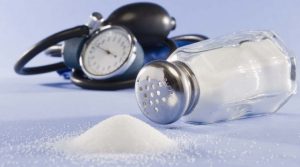 Who is at higher risk for health problems associated with excessive consumption of salt?
Who is at higher risk for health problems associated with excessive consumption of salt?
- People over 50 years old
- People who have high or slightly elevated blood pressure
- People who have diabetes
What happens to the body when excess sodium?
 Most people develop kidney problems because of prolonged excess sodium in the body. When food comes a lot of sodium, the body has to hold water to dilute it. This increases the amount of interstitial fluid and blood volume in the circulatory system.
Most people develop kidney problems because of prolonged excess sodium in the body. When food comes a lot of sodium, the body has to hold water to dilute it. This increases the amount of interstitial fluid and blood volume in the circulatory system.
Increased blood volume means increased heart and increased pressure on blood vessels. This mode leads to loss of elasticity of blood vessels, constantly elevated blood pressure, heart attack or stroke. It can also lead to heart failure.
There is evidence that excess sodium can damage the heart, aorta, and kidneys without increasing blood pressure. The excess salt can be harmful for bones.
High blood pressure is a major cause of cardiovascular disease. Two-thirds of all strokes and half of heart disease due to the high pressure.
In China, high blood pressure is a leading cause of death of over one million people a year.
The importance of potassium
Potassium sodium and have different effects on the health of the heart: High consumption of sodium salt increases blood pressure, which can lead to heart disease, while potassium helps to relax blood vessels and facilitates removal from the body of excess sodium, reduces blood pressure.
Our body's daily need much more potassium than sodium, but the modern diet it is just the opposite. For example, the Americans with food eat on average about 3,300 mg of sodium per day (who recommends no more than 2000 mg). About 75 percent of sodium comes from already finished products. In this case potassium get a day only about 2900 mg (who recommends 3500 mg or more).
The latest research in medicine provide more evidence that high salt content in food have a negative impact on health. So, scientists have discovered that:
- People who eat a diet high in sodium and low in potassium, have a higher risk of dying from a heart attack or any other reason;
- people can make a key change in the diet to help to reduce the risks: we need to eat more fresh vegetables and fruits, which contain potassium and sodium is low; there is less bread, cheese and processed meat, since these and other processed foods contain a lot of sodium salt and little potassium.
American researchers have found that the risk of premature death in people with a high level of sodium intake is 20% higher than in people with a low level of consumption. And in people with maximum potassium intake, the probability of premature death was 20% lower than that of people with minimal consumption.
But what may be even more important for health - is the ratio of sodium to potassium in the diet: people with the highest sodium ratio to potassium in the diet of a heart attack the risk of death was 2 times higher than that of people with a minimum ratio, while at the their risk of dying in any other way was by 50 percent higher.
 Cardiovascular disease
Cardiovascular disease
High blood pressure caused by the consumption of large amounts of sodium may lead to stroke, heart disease and heart failure.
Studies also show that reducing the sodium content in the diet reduces cardiovascular morbidity and mortality in the long term.
3 key studies on sodium and cardiovascular disease:
- In 1980-ies the researchers measured the amount of sodium intake over a 24-hour period among more than 10,000 adults from 32 countries. The average out of about 4,000 milligrams of sodium a day. But the spread of statistics was enormous: from 200 mg per day in people of Yanomami tribe from Brazil to 10 300 mg in Northern Japan.The population with higher intakes of salt had higher average blood pressure and greater increase in blood pressure with age. Four groups of people four countries with salt intake at least 1300 milligrams a day – had lower average blood pressure and had almost no tendency to increase in blood pressure with age.
- In the late 1980s and early 1990s, two studies were carried out on prevention hypertension. Scientists have tested the effects of lifestyle changes on blood pressure, including through loss of weight, stress management, nutritional supplements, and reduced sodium intake. In each of the studies, a slight decrease in blood pressure was observed with a decrease in sodium in the period from 18 to 36 months of the test. Years after the end of the experiment, the researchers examined the participants and found that:
- 10-15 years, members of the group that have reduced sodium intake, have the risk of heart attack or stroke by 25% lower;
- The higher the ratio of potassium to sodium in the diet study participant, the lower are the chances of developing cardiovascular disease.
This means that the strategy, which includes an increase of potassium and sodium in the diet may decrease to be the most effective way to combat high blood pressure.
- Dietary approaches to the prevention of hypertension, launched in 1994, became the most important achievements in the study of blood pressure, showing the link between diet and blood pressure. The study contributed to the development of the scientific basis for the main principles of a healthy diet for Americans, including recommended to reduce daily sodium intake to amounts less than one teaspoon.
Other diseases
Cancer
Scientific studies suggest that higher consumption of salt sodium is associated with an increase in stomach cancer. The World Cancer Research Fund and American Institute for cancer research have concluded that sodium salt and contain its products are "likely cause of stomach cancer."
Osteoporosis
The amount of calcium that the body excretes with urine increases with the amount of sodium salt that we eat. If calcium in blood is not enough, then it will be leached from the bones.
|
|---|
Studies have shown that lowering sodium consumption leads to a positive calcium balance - it is assumed that the reduction in salt intake can slow the loss of calcium from the bones, which also occurs with aging.
Reduce sodium salts to normal and reduce potassium deficiency in nutrition will help salt Solena with a low sodium content (70% sodium salt, 30% potassium salt). Click to see where to buy salt SOLENA.








